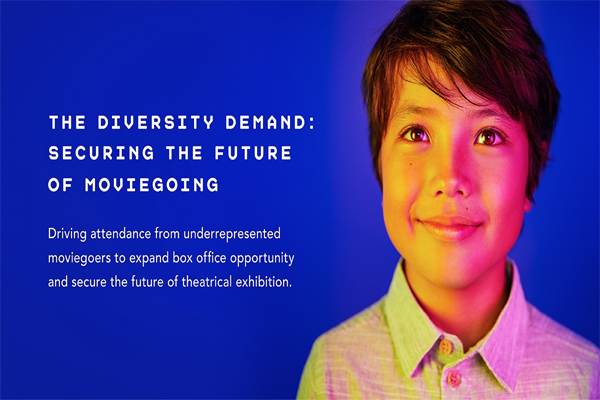Diverse representation in film and cinema is vital for box office success, according to film industry marketing & data firm, Movio.
Its latest White Paper, The Diversity Demand: Securing the Future of Moviegoing, confirms “that diverse representation in film is vital to drive attendance from underrepresented groups, if the industry is to secure the future of cinema”.
The research provides evidence that demonstrates films featuring underrepresented minority groups influence “less engaged moviegoers from the same demographic profile to visit the theatre”. In short, the analysis reveals a direct correlation between a minority group’s representation on screen and that group’s audience turnout at cinema theatres, with some groups attending “in numbers at more than twice the usual rate”. Box office results for cinematic hits like Black Panther, Crazy Rich Asians, Coco and Us demonstrate that, confirms Movio’s analysis.
VITAL STATISTICS
The US film audience for Pixar’s Coco, for example, was nearly 75% more Latinx than the audience for another Pixar hit, Incredibles 2. The audience for the horror hit Us was nearly 100% more Black than the audience that attended a similar title, A Quiet Place. The diverse cast of Us also drew large numbers of non-Black moviegoers and was widely successful at the box office, making eight times its production budget.
Mega Blockbuster hit Black Panther also attracted an audience that was “38% more Black than Avengers: Infinity War”, confirmed Movio: “This is huge in absolute terms, with 40.7% of all Black US moviegoers attending Black Panther.”
In terms of romcoms, Crazy Rich Asians attracted an audience that was 186% more Asian, and What Men Want attracted an audience that was 296% more Black, than the audience attending Isn’t It Romantic. In fact, Crazy Rich Asians also brought in “a significantly higher share of first time, infrequent, and occasional Asian moviegoers than any other ethnic group” in the US, according to Movio’s findings.
However, when comparing superhero hits Wonder Woman and Aquaman, the analysis shows that the female led superhero title did not significantly alter the demographic profile of the audience in attendance, as both titles attracted an audience that was 40-41% female. Considering Hollywood’s longstanding hesitation to release a female-led superhero movie, the “absence of underperformance within a certain audience group (male moviegoers, in this case), may be as meaningful as a title’s over performance with another”, said Movio.
REPRESENTATION MATTERS
Movio believes that understanding how to attract diverse audiences “will soon be paramount to the success of filmmakers and marketers, and to the sustainability of the exhibition sector”.

“Today’s consumer has countless entertainment options, making it easier than ever for diverse audiences to find content that speaks to their tastes and experiences. If cinema is to remain relevant and continue having a cultural impact, it must attract these audiences by delivering more representative content,” pointed out Chief Commercial Officer and President of Movio Media, Craig Jones. He will discuss the White Paper findings during his appearance at the upcoming New York Film Conference.
Click here for a copy of the White Paper, The Diversity Demand: Securing the Future of Moviegoing.







































